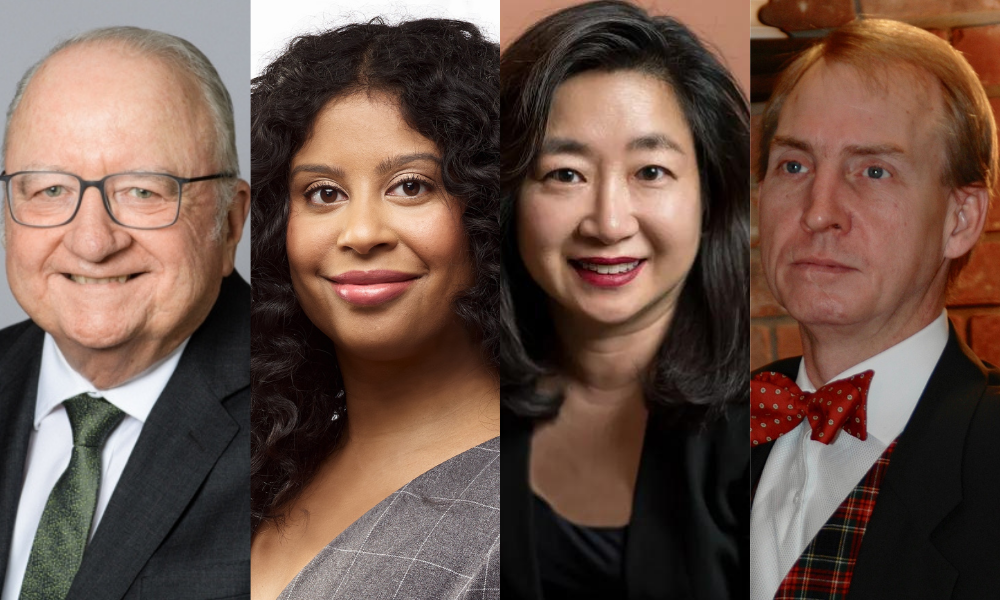
'People will mispronounce your names. If you want to take offence, that's your business,' Lyon said

The Law Society of Ontario benchers debated a motion at Thursday's Convocation relating to having a professional name reader call the names of new licensees.
Historically, names of new licensees have been called by benchers, and Bencher John Fagan brought a motion that the LSO maintain its status quo and benchers and no other person should read out candidate’s names at the June call to the bar ceremony.
The motion followed a memo presented to Convocation that stated that while the LSO has made efforts to ensure candidates’ names are pronounced correctly, mainly by distributing lists to designated readers and having candidates provide phonetic spellings of their names, the LSO continues to receive complaints from candidates about name mispronunciations every year.
“Our names are an incredibly important part of our identity. They carry deep personal, cultural, familial and historical connections. They also give us a sense of who we are, the communities in which we belong, and our place in the world. Mispronunciations or misuse of our preferred or common names can negatively affect and potentially hurt and impact a sense of belonging within the legal professions,” the memo states.
The memo noted that the switch to a professional name reader is responsive to concerns raised by candidates for at least a decade.
Fagan said the contemplated change triggers serious policy considerations. “I submit that hiring a professional name reader to read out the names of our candidates for admission at the LSO call to the bar ceremonies would be a serious policy error.”
He said the legal profession should project to all its members, their families and the general public that it is pleased to pursue authentic, human and lasting multiculturalism, which is “open-minded, open-hearted, open-faced and open-handed.”
Fagan said “real multiculturalism” involves people of different linguistic and cultural backgrounds working together, celebrating their increasing diversity and, among other things, doing the necessary mutual work to learn how to pronounce each other’s names face to face.
”Real multiculturalism doesn’t involve the cop-out as it were of hiring outside professionals to take the load off us and does not involve people taking offence when on early meetings of people of different linguistic backgrounds names are accidentally mispronounced.”
Murray Klippenstein, who seconded the motion, said that until recently, the profession assumed that the ideals and aspirations of openness, opportunity, individual equality, non-discrimination and focusing on common humanity were a good basis for moving forward together as a society.
“Instead, our Canadian society and our law society is increasingly being taken over by an ideology of never-ending round the clock turbocharged identity politics, which many call ‘wokism’ or as I see it whacky wokism, in which every mispronunciation of someone’s name is considered an egregious microaggression and grounds to write a media article or social media posting trumpeting one’s personal grievance and entitlement.”
Bencher Atrisha Lewis read a letter by the South Asian Bar Association (SABA), which stated that the organization is concerned about the motion and urged benchers to listen to SABA’s submission and reject the motion.
The letter spoke for most SABA members who are first or second-generation lawyers and said that “having their name read at the call to the bar ceremony represents one of the most significant moments in not only their own lives but also the lives of their often immigrant families. Families who have sacrificed and endured great hardship to hear their family names read out in hallowed places that they never thought possible.”
The letter noted that certain SABA members have expressed that the mispronunciation of their name can often evoke feelings of anger, awkwardness and shame.
“Many studies have shown how name mispronunciation can be considered a behavioural aggression, defined by researchers at Columbia University as brief and commonplace, daily verbal, behavioural or environmental indignities, whether intentional or unintentional that communicate hostile, derogatory, or negative racial slights and insults towards people of colour.”
The letter said that allowing the use of professional name readers ensures that licensing candidates of all backgrounds feel equally valued and represented during their call to the bar ceremony.
Bencher Julia Shin Doi stressed that times have changed and mispronouncing a person’s name is no longer acceptable. “Pronunciation of one’s name correctly is the most respectable thing we can do especially on the day that is so very important to so many licensees. They are being introduced into the profession and we need to get it right, so the investment in a name caller is the right thing to do.”
During the debate, Bencher Cecil Lyon said that many of the comments show that some benchers have forgotten forgiveness. “Life is messy. Bencher Shin Doi’s expectation that names should be pronounced correctly is wholly unrealistic,” he said. “People are going to mispronounce your names. If you want to take offence, that’s your business. That’s a decision you make.”
The motion failed 29-24 with one abstention.